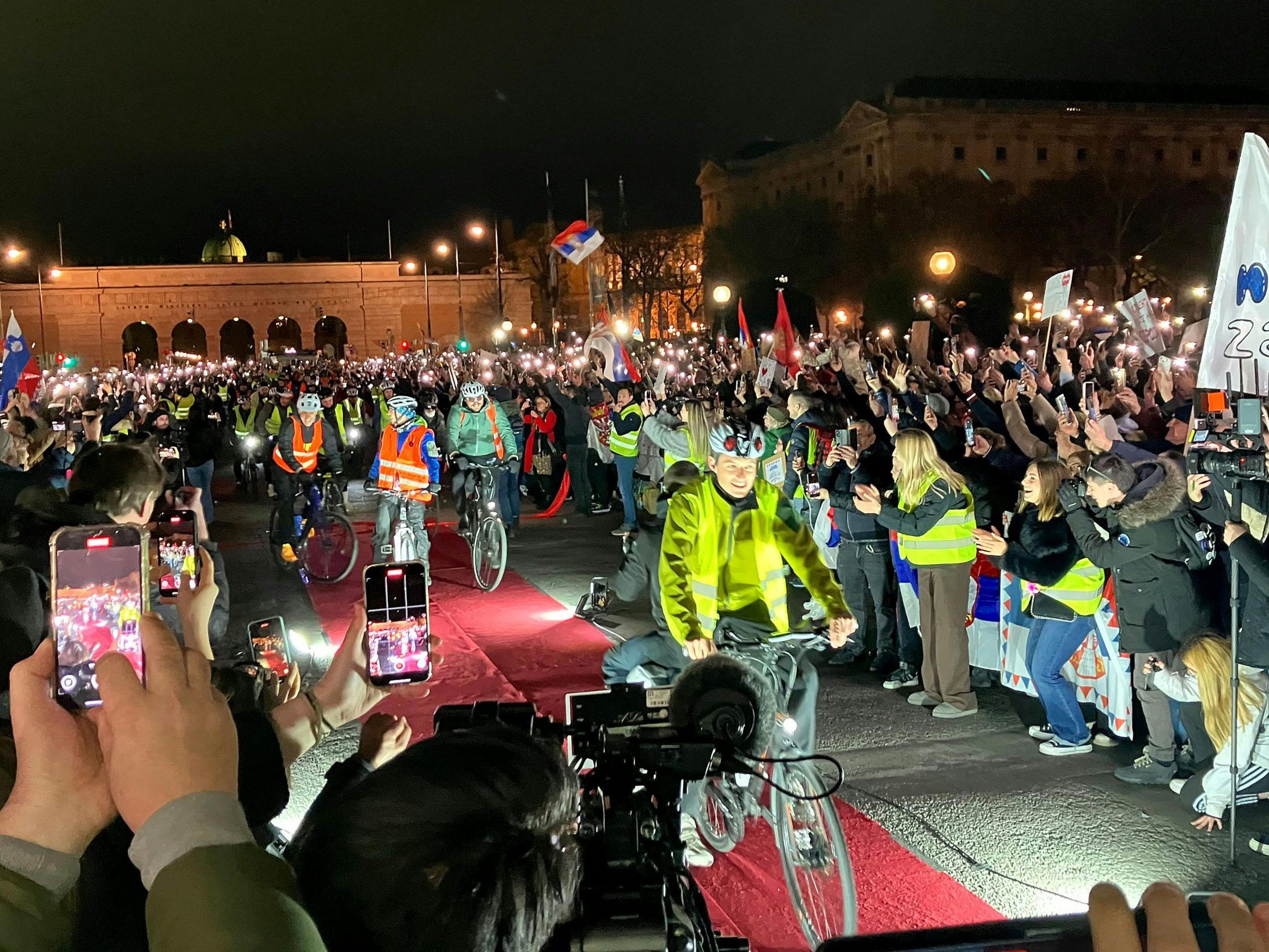Jubilant Reception of Serbian Protest Cyclists in Vienna

Around 2,000 people gave the Serbian protest cyclists an enthusiastic reception in downtown Vienna this Monday evening. With almost four hours of delay, the 80 students arrived at Maria-Theresien-Platz at 9:15 PM and were celebrated by the Serbian diaspora in Vienna like Olympic champions. For successfully completing the fifth stage on the way to the European capital Strasbourg, there were even certificates and medals.
2,000 People Cheered Serbian Protest Cyclists in Vienna
"Tens of thousands of people want to return to Serbia, under one condition: that something changes in Serbia," said 19-year-old Petar after arriving in an APA interview. "That's why we are on our way to Strasbourg and we will bring about the change." From Austria and Europe, he expects one thing above all: "Drop (Serbian President Aleksandar, ed.) Vučić. Raise your voice."
The early elections promised by Vučić are viewed skeptically by the student. They will only be free and fair "if the students organize everything - from the election commissions to equality in the media sector," said Petar. Like his fellow campaigners, he did not mention his last name, but he is not worried about his personal safety or that of his relatives. "The regime has already attacked my relatives, and me too. If they want to do something to me, then they have to reconcile that with their conscience."
"Pumpaj" Chants at Vienna's Maria-Theresien-Platz
The cyclists covered more than 140 kilometers this Monday, which was by far the longest daily stage of the tour that began on Thursday in Novi Sad, northern Serbia. However, due to the wind, the tour from Budapest to Györ on Sunday was more exhausting, said Petar.
The delayed arrival did not dampen the spirits of those waiting at Maria-Theresien-Platz between the Kunsthistorisches and Naturhistorisches Museum. Serbian music blared from speakers, and people danced on the red carpet rolled out for the cyclists. As they rolled in from the Ring, the battle cry of the Serbian cycling movement, "Pumpaj," echoed across the square, which was bathed in a sea of phone flashlights. At the finish line, the cyclists embraced each other and lifted their racing bikes high. The diversity of the protest movement was evident in the details: while one cyclist carried an icon over the red carpet, another held a Pikachu stuffed toy in his arms. Serbian flags were also frequently seen.
Tour Has So Far Gone "According to Plan"
A spokesperson for the group had previously told the APA that the tour was going "according to plan." "The only problem was that we didn't have a police escort in Hungary, but that didn't bother us," she said during a stopover in Bratislava. There, too, the cyclists were welcomed by the local Serbian community, as they had been on Saturday in Budapest. Several hundred people had awaited the arrival of the protest cyclists there.
The group, consisting of 80 students from all state universities in Serbia, set off on Thursday from Novi Sad to draw attention to the political crisis in the largest country of the Western Balkans at the European institutions in Strasbourg - the Council of Europe and the European Parliament.
"Our streets, once places of hope and encounters, have become scenes of fear and injustice. Our friends and colleagues are being arrested for speaking the truth, institutions have become tools of repression," students shared on their internet portal, where their cycling tour can be followed live.
Protest Cyclists Plan Four Overnight Stays in Austria
The cyclists aim to arrive in Strasbourg next Tuesday. The "Race for Justice" takes place in 13 daily stages, each covering around 100 kilometers. The group will be in Austria until Friday morning, with overnight stays planned in Vienna, Emmersdorf, Linz, and Salzburg. Tomorrow, Tuesday, only 88 kilometers are on the schedule, with the stage destination in Emmersdorf near Melk. On Wednesday, it's 100 kilometers to Linz, and on Thursday, 128 kilometers to Salzburg.
The protests were triggered by the collapse of the train station roof in Novi Sad on November 1, which resulted in the deaths of 16 people. Charges were filed against 13 responsible parties as early as November, but the judiciary has yet to confirm them. Two ministers have resigned due to the disaster, which was likely caused by corruption. The protest movement reached its peak in mid-March with a large rally in Belgrade, which ended abruptly. Participants then accused the authorities of using a banned sound cannon.
(APA/Red)
This article has been automatically translated, read the original article here.





